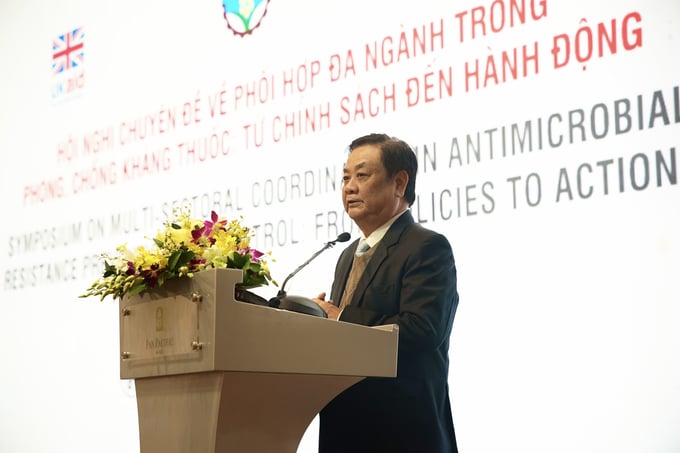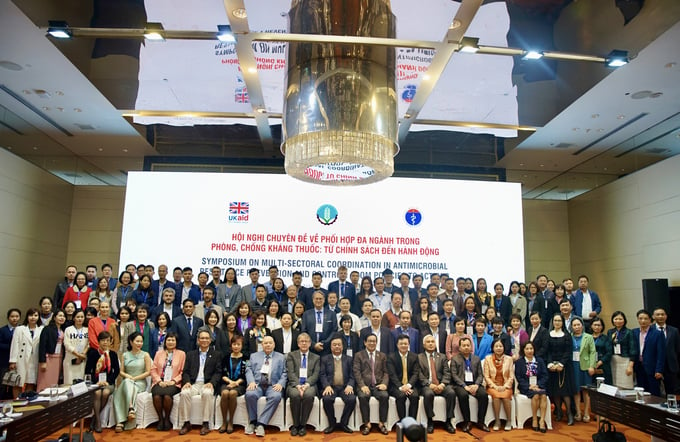May 20, 2025 | 22:14 GMT +7
May 20, 2025 | 22:14 GMT +7
Hotline: 0913.378.918
May 20, 2025 | 22:14 GMT +7
Hotline: 0913.378.918
The Minister asserts that Vietnam must undertake further measures to prevent and combat antibiotic resistance in the livestock sector. It is essential to identify specific clusters, including both large and small-scale enterprises, within the livestock industry to introduce initiatives, ideas, policies, and recommendations tailored to the affected communities and entities that need transformation.
"At present, combating antibiotic resistance is a top priority for the sector. However, this task requires collaborative efforts not only within individual sectors but also across relevant ministries such as Health, Natural Resources and Environment, Industry and Trade, and especially leveraging resources from international organizations and private sectors both within and outside the country," stressed Minister Le Minh Hoan.

Minister Le Minh Hoan said that preventing and combating antibiotic resistance is a priority task of the industry. Photo: Linh Linh.
The Minister also highlighted the involvement of all levels of government, organizations, boards, and departments in communication efforts to raise awareness among the public. Livestock farmers need to be responsible in the judicious use of antibiotics for animal treatment. Furthermore, active participation from livestock farmers, aquaculturists, animal feed producers, and veterinary medicine manufacturers is essential.
The Ministry of Agriculture and Rural Development collaborates with the Ministry of Health, supported by the Fleming Fund from the United Kingdom through the International Family Health Organization (FHI360), to jointly organize a conference contributing to the implementation of Prime Minister's Decision No. 1121/QD-TTg dated September 25, 2023, regarding the "National Strategy on Antibiotic Resistance Prevention and Control in Vietnam for the period 2023-2030, with a vision to 2045."
The escalating trend of antibiotic resistance shows no signs of abating, causing severe damage to the economy, society, public health, and is highly concerning worldwide. According to the World Health Organization, the spread of antibiotic-resistant bacteria has led to ineffective or failed treatment of infectious diseases, negatively impacting clinical outcomes and even resulting in mortality. By 2050, an estimated 10 million deaths per year may occur if current trends persist.
Combating antibiotic resistance is a collective effort, and the One Health approach is key to success. In recent years, many countries and international organizations have proposed solutions to ensure the rational use of antibiotics and mitigate antibiotic resistance. This includes precise prescribing, proper antibiotic usage guidelines, and monitoring the duration of antibiotic use.
However, the pace of research and development of new-generation antibiotics does not match the increasing prevalence of antibiotic-resistant bacteria. Therefore, organizing educational programs and communication campaigns to change perceptions and practices regarding antibiotic use must be accelerated to prevent the misuse of antibiotics in healthcare, livestock farming, veterinary medicine, and the community at large.
Associate Professor, Dr. Luong Ngoc Khue, Director of the Medical Examination and Treatment Department, Deputy Head of the National Steering Committee on Antibiotic Resistance Prevention and Control at the Ministry of Health, stated that the overarching goal is to impede the progression of antibiotic resistance, control the spread of antibiotic-resistant microorganisms, and manage infectious diseases. Simultaneously, it aims to ensure the continuous availability of antimicrobial drugs and their effective use in treating infectious diseases in both humans and animals. This concerted effort contributes to safeguarding, caring for, and enhancing the health of humans and animals, protecting the environment, and promoting the socio-economic development of the nation.

Delegates attended the ‘Symposium on multi-sectorial coordination in antimicrobial resistance prevention and control: From policies to actions’ on December 5.
According to Mr. Khue, the primary focus of the solution group is to coordinate actions and foster cross-sectoral responses to prevent and combat antibiotic resistance. Collaboration is needed to establish a common Action Framework as the foundation for multi-sectoral cooperation. This involves coordinating, implementing, and monitoring actions based on the specific responsibilities of each sector. It also entails developing and executing Action Plans for each sector, including healthcare, agriculture, environment, and industry, to address the root causes of antibiotic resistance in their respective domains.
The representative from the Ministry of Health emphasizes the importance of translating macro-level policies into local enforcement. They advocate for the supplementation and refinement of mechanisms that effectively coordinate cross-sectoral information sharing on antibiotic resistance and the consumption of antimicrobial drugs between central and local authorities. Additionally, the creation of monitoring and evaluation indices for the healthcare, agriculture, industry, and trade sectors is essential.
Deputy Ambassador of the United Kingdom to Vietnam, Marcus Winsley, commends Vietnam as a frontrunner in the global fight against antibiotic resistance through action plans, achievements in raising awareness among healthcare personnel and the general public, monitoring antibiotic use, and implementing various antimicrobial resistance management programs.
During the discussion, the representatives from the British Embassy also introduced the Fleming Fund, established by the UK government in 2015, with a £265 million program addressing antimicrobial resistance worldwide. Since 2019, the fund has supported Vietnam in further strengthening its antibiotic resistance monitoring systems. Experts and program project managers have identified priorities within the monitoring system in Vietnam, focusing on antibiotic resistance in humans and animals within the framework of One Health.
Translated by Dieu Linh

(VAN) In 2024, over 295 million people across 53 countries and territories faced acute hunger—an increase of almost 14 million people compared to 2023, while the number of people facing catastrophic levels of hunger reached a record high.

(VAN) World Environment Day 2025 (June 5) carries the theme 'Beat Plastic Pollution' continuing to emphasize the global urgency of addressing the plastic waste crisis.

(VAN) This was the assessment shared by experts at the workshop titled 'Assessing the Role and Potential of Low-Emission Rice Production Systems in Vietnam,' held on the morning of May 19.

(VAN) Cai Rong Port is the fisheries control center of Quang Ninh, helping to monitor fishing vessels, combat IUU fishing, and remove the EC's 'yellow card'.

(VAN) The German Agricultural Society (DLG) explores the possibility of establishing a mechanization service center in Vietnam’s Mekong Delta to support farmers in accessing and utilizing advanced machinery.

(VAN) On May 16, the Department of Water Resources Management, in collaboration with the Food and Agriculture Organization of the United Nations (FAO), held a signing ceremony for the GEF-8 project document.

(VAN) Food safety, mechanization, vocational training, and market opening are key areas of cooperation expected between the Vietnamese Government and the Federal Republic of Germany.